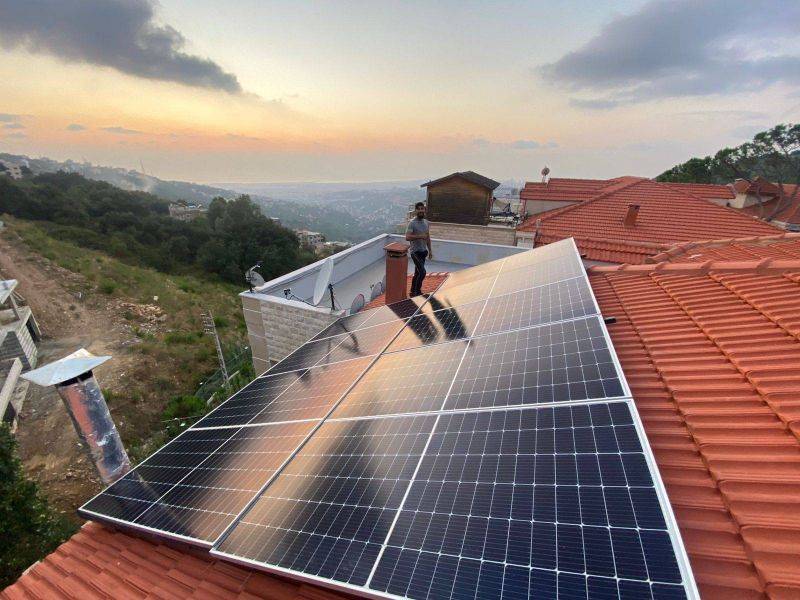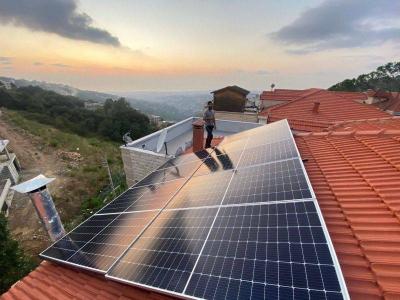The unfulfilled promises of the Electricite du Liban to improve electricity supply from two to ten hours a day have led consumers, both individuals and institutions, to increasingly turn towards the option of acquiring electricity by investing in their own solar panel networks, forcibly abandoning the option of subscriptions to private generators, the costs of which have become impossible for most social classes, reaching a minimum of three million Lebanese pounds monthly.
Amid dwindling hopes for increased public electricity supply due to political obstacles linked to electricity imports from Jordan and gas from Egypt, and with the approaching end of the supply contract for Iraqi fuel for production facilities in two months, it has become evident to followers of this issue the widespread deployment of metal tents carrying black panels on the roofs of buildings, homes, and even available gardens and yards, particularly in towns and villages, reflecting the exceptional demand for this alternative option.
This is accompanied by a notable increase in market offers for sales and installation from companies importing equipment and wholesalers whose numbers are growing organically, exceeding the high demand. Meanwhile, apartment owners in major urban buildings are trying to finalize private agreements or await favorable solutions to address the problem of shared property rights over the roofs and available spaces.
At the same rapid pace, "Asharq Al-Awsat" observed that bank administrations are becoming aware of the financial employment potential in this promising market. Many banks have designed products to provide loans that fulfill the liquidity needs of those in need, with installment interest rates ranging from 5% to 10% annually, aiming to enable them to obtain their own electricity networks immediately via solar energy. This will undoubtedly lead to a strong and multiplied momentum for this emerging market, noting that the average cost of a home network ranges between 5,000 and 7,000 dollars, equivalent to between 150 and 200 million Lebanese pounds, depending on the prevailing exchange rate.
As the market awaits the first launch of new lending operations at the beginning of next week with the "Housing Bank" announcing the title of its electronic portal dedicated to meeting energy loan requests as part of a comprehensive initiative that includes a package of housing loan products targeted particularly at low-income individuals, especially in rural areas, bankers confirmed to "Asharq Al-Awsat" that no less than six banks are simultaneously putting the finishing touches on launching new retail financing products, led by loans dedicated to solar energy.
This anticipated financing influx will be exclusively in Lebanese pounds at this stage due to inherent risks limiting the resumption of lending in dollars until sufficient guarantees for repayment in the same currency are provided, marking an exceptional, albeit timid, recovery of banks' function in the credit sector, after a long and enforced retreat approaching the end of its third year due to financial and monetary crises that have undermined most banking operations and lending systems for individuals and companies alike, leading to a sharp contraction in financing portfolios in the banking sector from nearly 53 billion dollars to less than 20 billion dollars, amidst significant losses in the values repaid at the official exchange rate for loans denominated in dollars, which also applies to all previous financing in Lebanese pounds.
The Chairman of the Board and General Manager of the "Housing Bank," Antoine Habib, affirmed that the initiative to design a package of loans dedicated to helping Lebanese individuals with low incomes is at the core of the bank's existence and missions.
Starting next week, "we will make these products available to the targeted individuals tied to low-interest rates in Lebanese pounds that will not exceed 5%, along with technical facilitation through the website that will allow applications to be submitted and initial approvals to be obtained completely before heading to our headquarters or branches in the governorates."
Habib stated in an interview with "Asharq Al-Awsat" that the absence of banks from financing for a relatively long time could pose serious risks in the future, as it distances them from a broad base of customers and direct partnerships in all productive sectors needed to meet the needs of individuals and companies. Credit is a pivotal foundation in the work of banks and a source of their strength as a locomotive for the national economy, in addition to its precedence in investment feasibility and sustained profitability during the promised recovery phase.
Regarding the limited resources available to banks, amid pressures arising from crises and liquidity constraints affecting the country, Habib confirmed that "in addition to our own capabilities from our capital, and the allocations we rely on, from our shareholders distributed between 80% for private banks and 20% for the state, we will rely on a generous funding source of about 165 million dollars through efforts aimed at reviving a soft loan agreement with the Arab Fund for Economic and Social Development (based in Kuwait), noting that this soft loan agreement is the third of its kind between the fund and the bank."
The package of loans to be launched by the bank includes a home purchase loan with a maximum amount of one billion pounds as a substitute for purchasing an apartment, with repayment installments over 30 years, and a home renovation loan with a maximum amount of 400 million pounds paid over 10 years. As for solar energy loans, the financial ceiling ranges between 75 and 200 million pounds, with installments over 5 years, adopting a unified annual interest rate of 4.99%.




